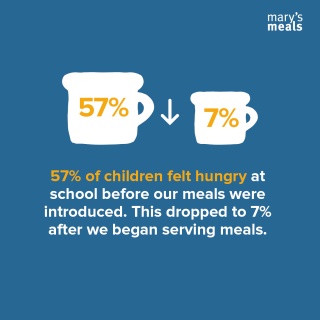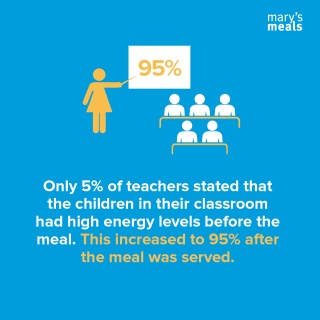
School meals pave the way for generational change in Africa
Mary’s Meals’ latest impact report reveals how school feeding is driving education and health gains across our programme countries.
For more than 20 years, Mary’s Meals has focused on providing school meals to reduce hunger and promote access to education. We believe that daily meals served in a place of education offer a simple solution to child hunger, with wider impacts on children’s education and wellbeing globally.
Our latest Annual Impact Report spans six African countries – Malawi, Liberia, Madagascar, Zambia, Kenya and Zimbabwe – where we support community-led school feeding for more than 1.5 million children every school day.
More than 300 teachers, 3,000 children and 120 caregivers participated in surveys, interviews, focus groups or open-ended discussions to present an overview of the effect of meals on school enrolment and attendance, children’s wellbeing and education, and the socio-economic benefits for families and communities.
The key message from report is a direct correlation between our school feeding programmes and positive outcomes for children in their overall wellbeing and educational development.
Improving children’s ability to participate and learn
Across four of our large country programmes – Kenya, Malawi, Liberia, and Zambia – 84% of children reported that they never left school early because of hunger, and 99% of teachers stated that meals reduced the number of children dropping out.
The report also notes that school feeding increased children’s ability to focus, participate and learn. Before the meal, only 36% of children felt they could concentrate well, but this increased to 98% after they had eaten.
The data collected in Madagascar and Zimbabwe surveyed pupils in schools serving Mary’s Meals for the first time – with research conducted before feeding was introduced, then repeated after the programme was established. School feeding was shown to have a positive effect on school attendance.
Before the meals were introduced, 39% of children surveyed in Madagascar reported that they missed school at least once a week, often because of hunger. After school feeding began, only 7% missed school and never because of hunger.
Delivering food security for families
The findings from Madagascar also illustrate the impact of school feeding on children’s wider families through data collected from householders. Notable themes include resource re-allocation, where caregivers reported being able to redirect some of their limited resources towards other essential needs because their children would eat a filling meal at school.
The same surveys also found that food security improved for families where children received consistent daily meals in school because the food available at home would stretch further and caregivers were more available for work because children would happily spend the whole day in school without coming home to look for food.
Another consistent theme among householders in Madagascar is improved mental and physical wellbeing, where parents and caregivers noticed an improvement in children’s health because of the benefits of daily meals served in school and whole families worried less about hunger because of the reliable school meal programme.
And in Zimbabwe, children reported similar benefits. Before the programme began, 44% of children surveyed in Zimbabwe felt worried about hunger at school. After the programme started, this dropped to just 3%.
Increasing well-being for communities
Mary’s Meals first began impact reporting with a five-year assessment in 2013, which has been followed by regular research and reports in the years since. Consistent findings show that Mary’s Meals’ school feeding programmes reduce child hunger, give children energy and improve pupil wellbeing at school, and help more children to access and engage with education.
Erin Pratley, Director of Programme Development & Operations at Mary’s Meals, says: “What excited me most about this research was exploring parent perspectives for the first time. We are now seeing strong evidence of the far-reaching impacts of our school feeding programme – not only for the children receiving the daily meals, but for the families and communities where the children live.”
Clare Nolan is our Head of Programme Development. She leads Mary’s Meals’ Development function which focuses on need and sustainability, as well as impact and learning from across our global programmes.
It costs just £19.15, €22, $25.20 USD or $31.70 CAD to provide a child with school meals for an entire school year. Learn more about the impact of our life-changing school feeding programme.


